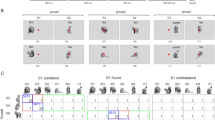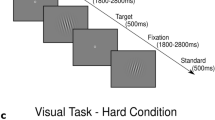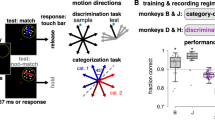Abstract
EFFICIENT behaviour in the visual environment requires selection between stimuli competing for control of action. Many current models of selection are spatial: relevant objects are chosen by attending to their locations1–3. The unilateral stimulus extinction observed following lesions of the parietal lobe provides evidence for spatial selection4. Such patients may identify a single stimulus presented in their contralesional field, but can fail to detect the same stimulus when a competing stimulus is shown simultaneously on the ipsilesional side5. Here we demonstrate that extinction need not be spatial in nature, but may be determined by characteristics of the objects to be selected. In two patients with parietal lobe lesions and poor spatial localization, pictures extinguished words and closed shapes extinguished open shapes. This object-based extinction indicates the existence of biases within non-spatial selection mechanisms which are independent of biases produced by spatial selection mechanisms. We suggest that selection of objects for action requires that the 'winners' produced by the independent competitive biases for selection are bound together within distinct neural areas concerned with object properties and space.
This is a preview of subscription content, access via your institution
Access options
Subscribe to this journal
Receive 51 print issues and online access
$199.00 per year
only $3.90 per issue
Buy this article
- Purchase on Springer Link
- Instant access to full article PDF
Prices may be subject to local taxes which are calculated during checkout
Similar content being viewed by others
References
Posner, M. I. Quart. J. exp. Psychol. 32, 3–25 (1980).
Moran, J. & Desimone, R. Science 229, 782–784 (1985).
Mozer, M. C. & Behrmann, M. J. cog. Neurosci. 2, 96–123 (1989).
Posner, M. I., Walker, J. A., Friedrich, F. J. & Rafal, R. D. J. Neurosci. 4, 1863–1874 (1984).
Critchley, M. The Parietal Lobes (Edward Arnold, London, 1953).
Balint, R. Monatsch. für Psychiat. Neurol. 25, 51–81.
Coslett, B. & Saffran, E. Brain 114, 1523–1545 (1991).
Humphreys, G. W. & Riddoch, M. J. in Attention and Performance XIV (MIT Press, Cambridge, Massachusetts, 1993).
Egly, R., Driver, J. & Rafal, R. D. J. exp. Psychol.: General 123, 161–177 (1994).
Driver, J. & Halligan, P. W. Cog. Neurosci. 8, 475–496 (1991).
Kroll, J. F. & Potter, M. C. J. verb. Learn. verb. Behav. 23, 39–66 (1984).
Humphreys, G. W. Quart. J. exp. Psychol. 33A, 17–31 (1981).
Potter, M. C. & Faulconer, B. Nature 253, 437–438 (1975).
Biederman, I. Psychol. Rev. 94, 115–147 (1987).
Ungerleider, L. G. & Mishkin, M. in Analysis of Visual Behavior (MIT Press, Cambridge, Massachusetts, 1982).
Duncan, J. Perception 22, 1261–1270 (1993).
Author information
Authors and Affiliations
Rights and permissions
About this article
Cite this article
Humphreys, G., Romani, C., Olson, A. et al. Non-spatial extinction following lesions of the parietal lobe in humans. Nature 372, 357–359 (1994). https://doi.org/10.1038/372357a0
Received:
Accepted:
Issue Date:
DOI: https://doi.org/10.1038/372357a0
This article is cited by
-
Impaired texture segregation but spared contour integration following damage to right posterior parietal cortex
Experimental Brain Research (2013)
-
Opposite biases in salience-based selection for the left and right posterior parietal cortex
Nature Neuroscience (2006)
-
Non-spatially lateralized mechanisms in hemispatial neglect
Nature Reviews Neuroscience (2003)
-
Abnormal temporal dynamics of visual attention in spatial neglect patients
Nature (1997)
Comments
By submitting a comment you agree to abide by our Terms and Community Guidelines. If you find something abusive or that does not comply with our terms or guidelines please flag it as inappropriate.



